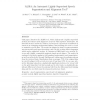Free Online Productivity Tools
i2Speak
i2Symbol
i2OCR
iTex2Img
iWeb2Print
iWeb2Shot
i2Type
iPdf2Split
iPdf2Merge
i2Bopomofo
i2Arabic
i2Style
i2Image
i2PDF
iLatex2Rtf
Sci2ools
157
click to vote
CSL
2016
Springer
2016
Springer
ALISA: An automatic lightly supervised speech segmentation and alignment tool
This paper describes the ALISA tool, which implements a lightly supervised method for sentence-level alignment of speech with imperfect transcripts. Its intended use is to enable the creation of new speech corpora from a multitude of resources in a language-independent fashion, thus avoiding the need to record or transcribe speech data. The method is designed so that it requires minimum user intervention and expert knowledge, and it is able to align data in languages which employ alphabetic scripts. It comprises a GMM-based voice activity detector and a highly constrained grapheme-based speech aligner. The method is evaluated objectively against a gold standard segmentation and transcription, as well as subjectively through building and testing speech synthesis systems from the retrieved data. Results show that on average, 70% of the original data is correctly aligned, with a word error rate of less than 0.5%. In one case, subjective listening tests show a statistically significant p...
| Added | 01 Apr 2016 |
| Updated | 01 Apr 2016 |
| Type | Journal |
| Year | 2016 |
| Where | CSL |
| Authors | Adriana Stan, Yoshitaka Mamiya, Junichi Yamagishi, Peter Bell 0001, Oliver Watts, Robert A. J. Clark, Simon King |
Comments (0)

